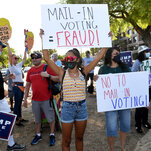Such rulings could have major consequences for election rules, but the court will find it increasingly hard to make major reversals of policies, said Edward B. Foley, an election law scholar
One factor, some experts say, is that an eight-member court could be deadlocked, and a 4-4 decision would automatically leave a lower court’s ruling intact.
Another is that time is running out to tinker with election laws.
“The probability of successful litigation to try to change the rules diminishes every day and every hour” as Election Day nears, Professor Foley said. “But on the other hand, the chances that somebody might be successful in undoing a change might not diminish.”
Both campaigns and election officials also need time to adjust their operations to changes in the law, Mr. Persily said. A clear ruling on whether states can send absentee-ballot applications to all voters, he noted, determines whether a campaign needs to spend money to mobilize vote-by-mail supporters.

“There’s a point at which the music has to stop and everyone has to sit in their chair,” he said.
A bent toward the status quo would generally favor Republicans, most of whose lawsuits have sought to block changes in election rules to make it easier to cast mail ballots — or to cast ballots in general. Lawyers for Democrats and voting rights advocates have fought for those same changes, often triggering appeals to higher courts.
Pennsylvania is one example: On Monday, right-leaning websites reported, the Republican-controlled State Legislature said it was preparing to ask the Supreme Court to stay a state court ruling that, among other things, allowed mail voters to place their ballots in drop boxes and extended the period in which late absentee ballots would be accepted as valid.
Many of the other cases that could be appealed to the court involve similar efforts to relax voting rules. In Nevada, the Trump campaign and the Republican National Committee have sued to overturn a new and far-reaching law aiming to make voting by mail easier. One provision of the law requires the state to give absentee voters postage-paid envelopes to return their ballots; the lawsuit argues that because prepaid mail is not generally postmarked, officials will have no way to determine whether late ballots were sent before the deadline.





